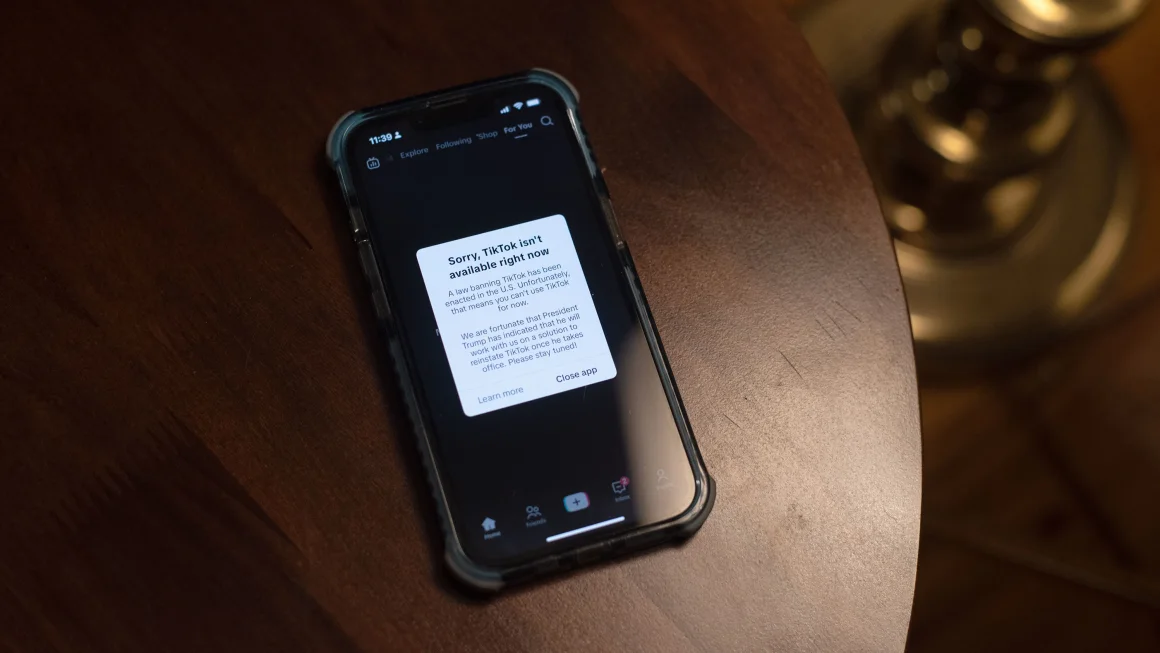TikTok Goes Offline in the United States Ahead of Ban, Leaving Millions Without Access
Late Saturday night, TikTok abruptly went offline in the United States, just hours before a federal ban was set to take effect. The blackout cut off access to the wildly popular social media platform used by over 170 million Americans.
Users attempting to open the app encountered a message:
“Sorry, TikTok isn’t available right now. A law banning TikTok has been enacted in the U.S. Unfortunately, that means you can’t use TikTok for now.”
This move follows a Supreme Court decision on Friday that upheld a bipartisan law passed by Congress and signed by President Joe Biden in April. The law prohibits U.S. companies from hosting or providing services to TikTok unless its Chinese parent company, ByteDance, divests the platform to a U.S. or allied buyer.
However, TikTok signaled a potential comeback as early as Monday. The company’s message hinted at ongoing negotiations, stating, “We are fortunate that President Trump has indicated that he will work with us on a solution to reinstate TikTok once he takes office. Please stay tuned!”
Trump Administration May Grant Reprieve
President-elect Donald Trump suggested that he might delay enforcing the ban for 90 days to allow time for a resolution. In an interview with NBC News on Saturday, he said,
“A 90-day extension is something that will most likely be done, because it’s appropriate. We need to look at it carefully; it’s a very big situation.”
Trump is expected to announce a final decision after his inauguration on Monday.
TikTok’s Uncertain Future
The ban has been brewing for months, fueled by concerns about TikTok’s ties to China and the potential national security risks posed by its access to vast amounts of user data. The app was removed from both Apple’s App Store and Google Play on Saturday, and other ByteDance apps, like CapCut, displayed similar shutdown notices.
The Supreme Court’s 9-0 decision to uphold the ban left many users, including influencers and small business owners reliant on the platform, scrambling for alternatives. While some expressed hope for TikTok’s return, the ruling dashed expectations of a last-minute legal reprieve.
Service providers, such as app stores and data-hosting companies, are reportedly concerned about legal liabilities and hefty fines for violating the ban. These concerns prompted TikTok to preemptively take itself offline.
ByteDance Resists U.S. Buyers
The law allows for a 90-day delay if TikTok demonstrates progress in selling to a U.S.-based company. However, ByteDance has rejected potential buyers, citing TikTok’s immense popularity and its economic value to American users and businesses.
In response to the Supreme Court’s ruling, Biden administration officials stated they would not enforce the ban during the federal holiday weekend, leaving the matter to the incoming Trump administration.
Pressure Mounts on Trump
TikTok’s reference to Trump in its shutdown message could increase pressure on the president-elect to
broker a deal. Trump, who has previously criticized TikTok as a security threat, has also acknowledged its influence, even highlighting his own popularity on the app.
Despite bipartisan support for the ban, some lawmakers, like Senator Josh Hawley of Missouri, maintain that TikTok poses an unacceptable risk. Hawley tweeted, “ByteDance and its Chinese Communist masters had nine months to sell TikTok. The refusal to sell reveals what TikTok truly is: a communist spy app.”
Alternative Apps on the Rise
In the wake of TikTok’s removal, similar apps have surged in popularity, including ByteDance-owned Lemon8. However, these apps may face similar scrutiny and restrictions in the future.
What’s Next for TikTok?
Speculation is growing that Trump may issue an executive order delaying the ban while negotiations continue. Analysts, such as Richard Greenfield of LightShed Partners, believe TikTok is likely to remain operational in the U.S.
On Saturday, Perplexity AI, a San Francisco-based startup, confirmed to CNN that it had submitted a bid to merge with TikTok, offering a potential path forward.
For now, TikTok’s fate remains uncertain, leaving millions of users in limbo and highlighting the complex intersection of technology, geopolitics, and national security in the digital age.
Source : CNN




